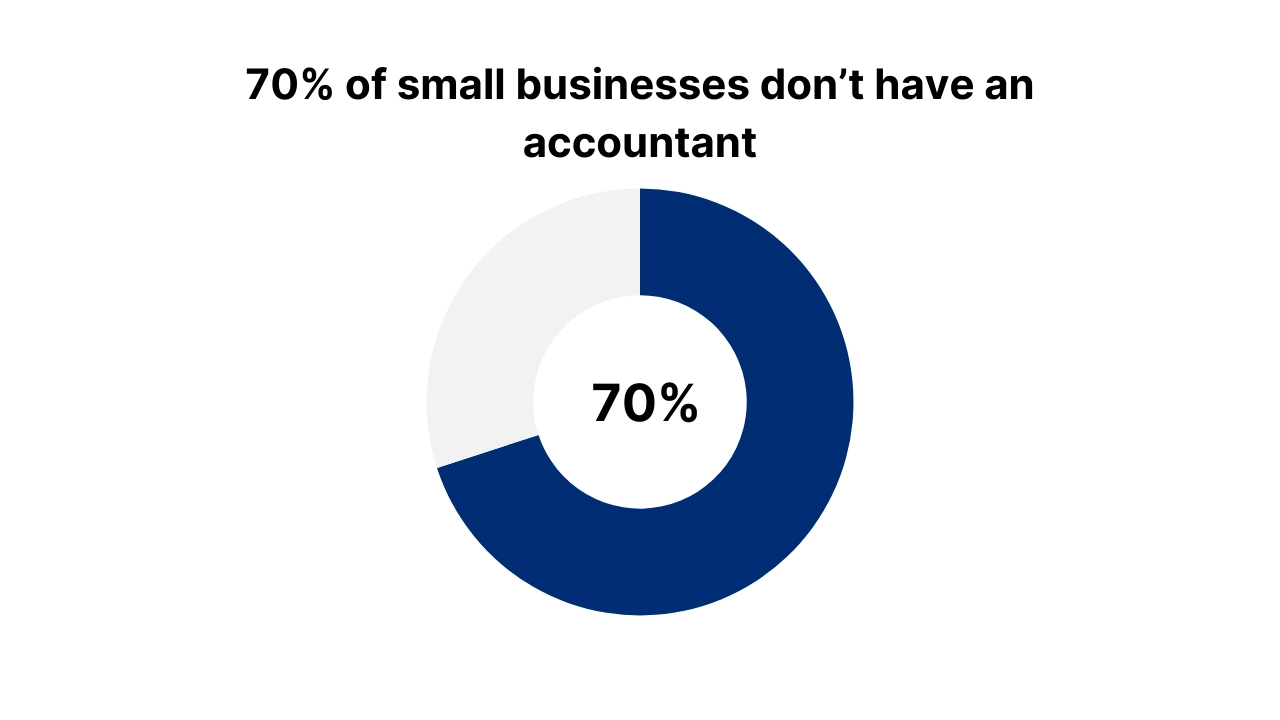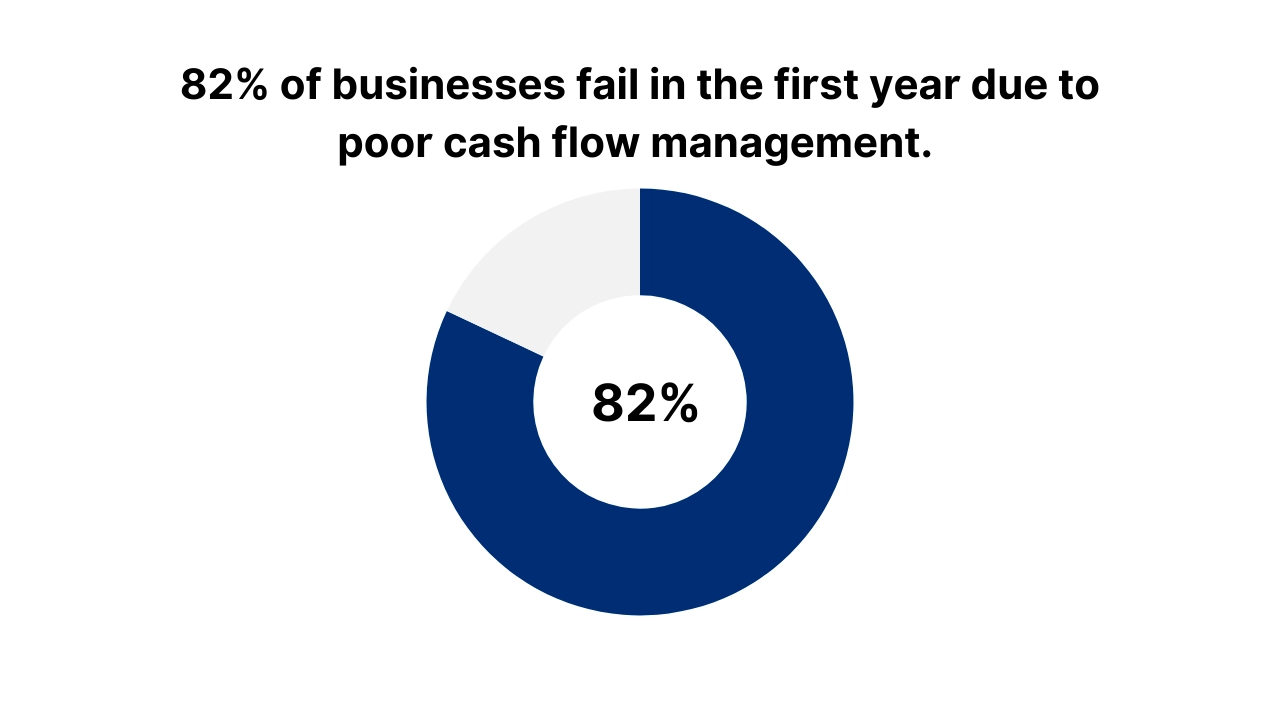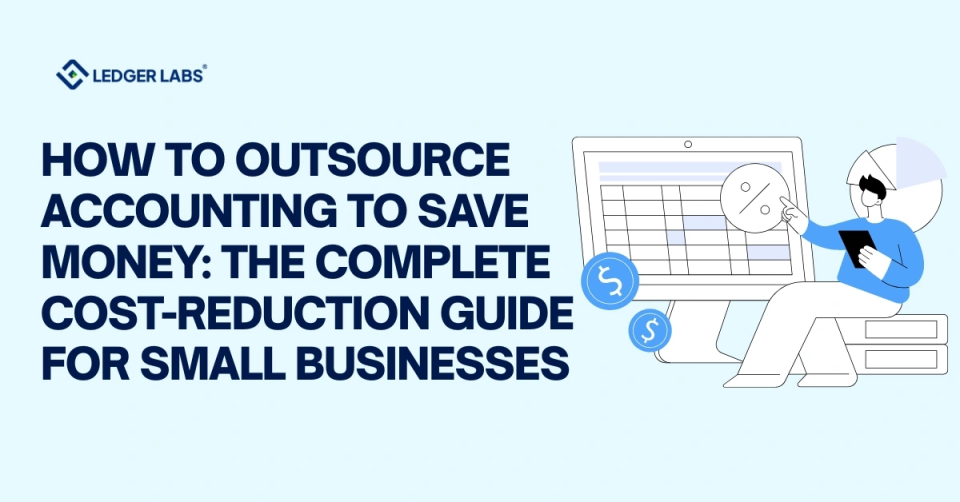Hiring an accountant is the most important decision for your business.
A professional accountant has the skills and knowledge to take your business forward.
Whether it is tax preparation or payroll management, an accountant can add value to your business and take some of the burden off your shoulders.
Now many business owners think that hiring an accountant is expensive.
But that’s where your perspective needs to evolve.
While you may lean towards hiring a full-time accountant, outsourcing your accounting may be affordable.
Let’s explore accounting and its affordable solutions for small businesses in the US.
- 70% of small businesses don’t have an accountant.
- Hiring an accountant helps businesses improve their financial performance.
- Outsource your accounting to get ongoing accounting support at a much lower cost.
- Ditch the traditional route and hire accountants based on their experience and technical knowledge.
Why is accounting ‘significant’ for small businesses?
Small business owners handle core business activities, overlooking everything from production to sales and marketing.
While every business unit holds its importance, the accounting department forms the core – a foundation upon which you build your business.
So, managing your business finances yourself makes sense only in the initial stages of your business as it helps you save money.
But with time, your business will grow, and so will the volume of data.
It will become impossible to pay attention to every single detail while also balancing other tasks with it.
And this is when you’ll realize the importance of delegation.
When you have an accountant, you can take a backseat, knowing that your finances are well-managed by someone reliable.
Most businesses think that a bookkeeper will help them stay on top of their finances. But they only help will tracking transactions and organizing data.

70% of small businesses don’t have an accountant. This means the business owners are handling finances.
But for how long?
An accountant helps you plan your finances and analyze growth opportunities.
Here’s a summary to help you understand what a regular day of an accountant would look like at work.
- An accountant prepares financial statements, like balance sheets and income statements.
- They manage your cash inflows and outflows, ensuring everything is recorded and reconciled.
- They handle payroll and vendor payments.
- They maintain and manage your business account.
- They identify growth and investment opportunities.
- They help with financial forecasting, and evaluating trends for informed decision-making.
- They organize financial information for tax filing and other amendments.
- They keep an eye out for eligible tax deductions so you save every last dollar of your hard-earned income.
- They provide you with a detailed financial analysis and help you with budgeting.
What roles should your accountant fulfill?
Knowing what a day as an accountant looks like gives you perspective.
It also helps you determine whether or not you need one in the first place.
Ask yourself the following questions:
- Are you struggling to keep a steady cash flow?
- Are delayed payments becoming a constant recurrence?
- Are you unable to pay your employees on time?
- Did you receive a penalty for non-tax compliance?
If you said yes to either of these questions, you must immediately consider hiring an accountant.

82% of businesses fail in the first year due to poor cash flow management.
These are major red flags that you can’t ignore.
3 benefits of hiring an accountant
It’s important to understand that hiring an accountant adds value to your business. Here are the three main benefits of hiring an accountant.
1. You can save time and money
Running a business requires time and patience. But it is important to realize where you put your time.
You can’t be sitting behind a desk, tracking every transaction, and recording the data to the tee.
While it is one of the most important tasks, it consumes a lot of time that could have been spent working around strategies or actively monitoring core business activities.
A discounted bookkeeper and an accountant are responsible for overseeing daily accounting, ensuring that all your business finances are in control.
Not only would that allow you to save time but also your energy.
2. You reduce tax liability and ensure compliance
Let’s understand what reducing tax liability means so you can see how it is beneficial to your business.
Reducing tax liability means you pay the exact tax amount you are supposed to pay.
It also means that your finances are on track.
Only a qualified tax professional has the knowledge and expertise to maintain tax compliance. They help businesses save money by claiming all eligible tax deductions.
Any miscalculation or misjudgment can be costly for your business.
So always hire an accountant with a complete understanding of the tax world.
It ensures you prepare and file your tax returns on time to avoid penalties.
3 actionable tips for hiring an affordable accountant in the US
Let’s look at the actionable tips for hiring an affordable accountant.
1. Look at their credentials and experience
A major part of the hiring process involves the evaluation of a candidate’s experience and credentials.
You must know who you are hiring, their capabilities, and how they can add value to your business.
You will find diverse portfolios – look for individuals with similar industry experience.
Mostly people fall into the trap of hiring the best candidates with traditional backgrounds.
But you’d be surprised that many businesses now lean toward non-traditional hiring.
They prefer profiles with more hands-on or on-ground experience than someone with an Ivy-league degree.
So hire an accountant who understands what your business needs.
Remember, businesses need to evolve as they grow, so choose someone who adapts well.
2. Conducts technical assessments
It is important to hire an accountant with accounting proficiency.
You can opt for a traditional test and include accounting questions.
Or you can conduct an in-depth interview and get to know how well they respond to your queries.
Provide them with real-life scenarios. Ask them what steps they would take in the following situations:
- When a business is experiencing cash flow problems
- When a business gets a penalty due to non-tax compliance
- When there’s inconsistency in financial statements
These questions would give you clarity and help you evaluate their problem-solving skills.
3. Interact and understand if they are the right cultural fit
You will probably interview several candidates for the same position.
Make sure your interactions are fruitful – either helping you see how well they fit into your company or not.
You have to determine their technical skills by throwing a bunch of real-life scenarios at them.
At the same time, evaluate how well they communicate, how flexible they are with multi-tasking, and how open they are to the idea of growing with you.
An ideal accountant has the technical skills and experience but is also easy to work with.
3 alternatives to hiring full-time accountants
Hiring a full-time accountant is expensive, especially if you run a small business. Here are three alternatives.
Outsource your accounting
Small businesses should look into outsourcing their accounting needs.
What it does is, you get a dedicated team of accountants on board who manage your finances for you.
Unlike a traditional accountant who is available on office premises at all times, this accountant is just a phone call away.
This accountant charges you for results, not merely for showing up.
They give you a holistic view of your finances, helping you manage your accounting, and providing regular audits to maintain consistency.
While there are monthly plans, you should ideally look into annual plans that are even cheaper.
Most organizations outsource their accounting during tax season, but it’s better to get year-round services to ensure timely and ongoing accounting support.
Hire freelance accountants
Another great option for startups is hiring freelancers.
In this case, you hire freelancers to handle your day-to-day accounting or you can book them for seasonal support.
While many argue that you are putting your financial data at risk by hiring freelancers, it is still one of the most cost-effective ways of fulfilling your accounting needs.
You can get around this situation by implementing cloud technology and other safety measures.
Leverage technology
If you don’t have any budget for hiring an accountant, you can do the next best thing: subscribe to accounting software.
There are so many accounting software that are user-friendly and affordable.
While you can opt for a monthly subscription, the best way to save money is by choosing the annual plans as they come with discounts.
Accounting software centralizes your accounting needs, ensuring data consistency as well as security.
The bottom line
Hiring an accountant helps businesses grow.
An accountant helps you save time and money. They can improve cash flow management, handle account payables and receivables, and strategize your finances more efficiently.
While hiring a full-time accountant may be expensive, you can always look for freelancers or outsource your accounting needs.
Ledger Labs, with 12+ years of experience, provides affordable bookkeeping and accounting services to businesses across industries.
We have the technical expertise and experience to cater to specific business needs.
Book a consulting appointment with us to find out more.












